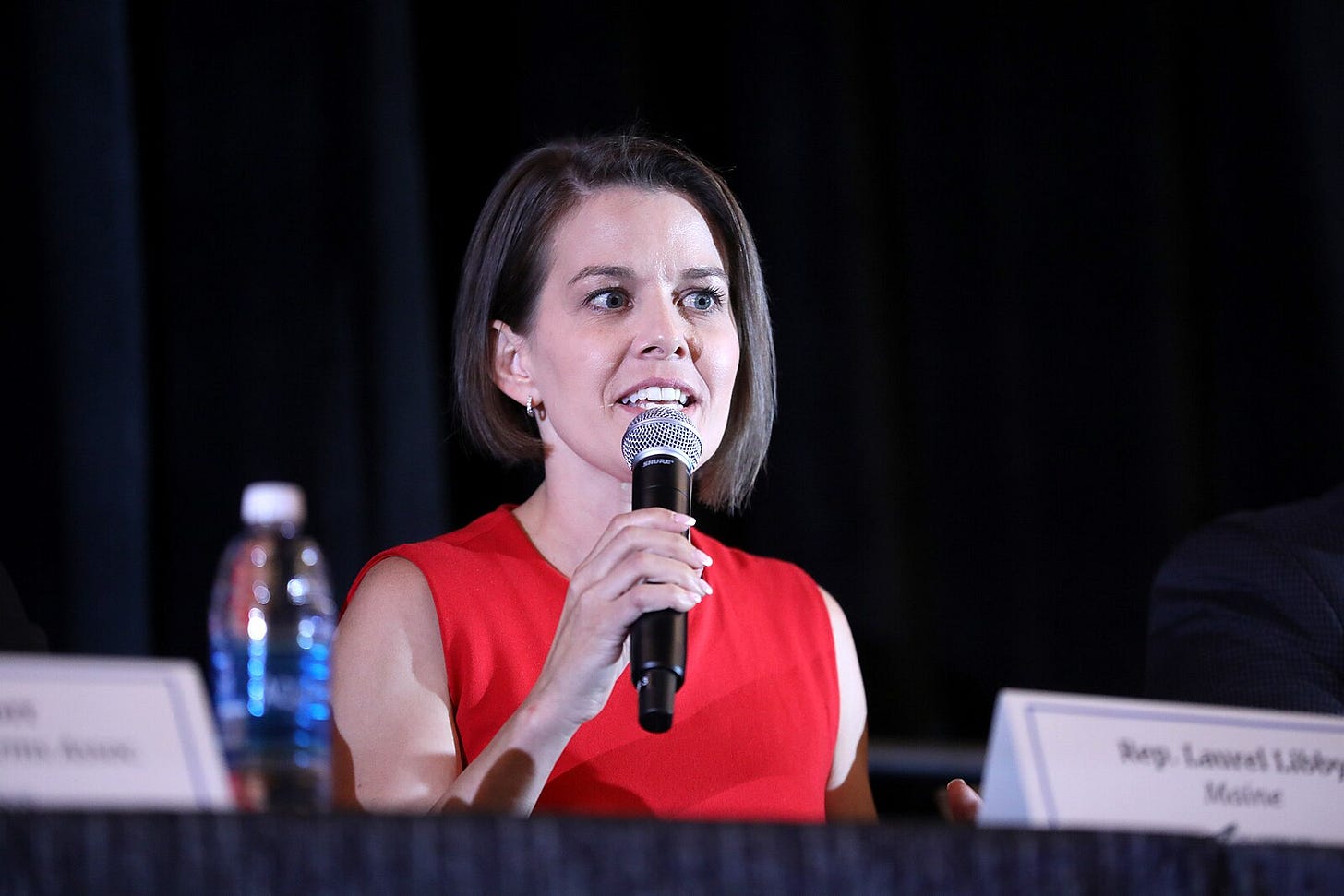A Free Speech Fight in Maine
A lawmaker was censored for posting about a transgender high school athlete.

Julian Bond was a pacifist, which got him into some trouble in the 1960s. As a student at Morehouse College, Bond helped found The Student Nonviolent Coordinating Committee, which engaged in peaceful protest and civil rights activism throughout the South, and vocally opposed the war in Vietnam.
Bond’s activism led him into politics, and in June 1965 he was elected to the Georgia House of Representatives. That’s where his trouble started. Other members of the House objected to Bond’s views on Vietnam, as well as statements he made in interviews after being elected. They began petitioning to have Bond’s position revoked and ultimately held a hearing on the matter.
A special committee voted to prohibit Bond from joining the Georgia House of Representatives. It left little doubt about its motives: It disagreed with Bond’s views on the war. Bond sued, and ended up before the Supreme Court.
The case, Bond v. Floyd, was a victory for Bond and for free speech. The Court unanimously held that a state legislature could not rescind Bond’s duly elected House seat based on comments he made on matters of public concern. “The manifest function of the First Amendment in a representative government,” Chief Justice Earl Warren wrote, “requires that legislators be given the widest latitude to express their views on issues of policy.”
If this seems clear-cut to you on principle, that opinion shouldn’t change as a result of the viewpoint in question. Unfortunately, recent events in the Maine House of Representatives show that not everyone agrees.
In February, Representative Laurel Libby posted a photograph on Facebook about a transgender high school athlete who won first place in girls’ pole vaulting at a Class B state championship. Libby wrote:
We’ve learned that just *ONE* year ago John was competing in boy’s pole vault... that’s when he had his 5th place finish. So all of this transpired in the last year, with the full blessing of the Maine Principals’ Association
Soon, the Maine House speaker and majority leader demanded that Libby delete her Facebook post. Libby refused, and that’s when her trouble started.
The Maine House majority leader introduced a censure resolution, which would be heard the next day. If Libby refused to apologize and retract her comments, the House would prohibit Libby from speaking on the House floor or voting on any legislation until she did.
Libby attempted to defend herself during the hearing but was repeatedly interrupted, and the censure ended up passing on a 75-70 party-line vote. This effectively rendered Libby incapable of fulfilling her elected duties until and unless she capitulated to the opinions and preferences of the majority—a clear act of viewpoint-based discrimination and censorship.
However you feel about the issue, transgender athletes in women’s sports is a matter of intense political debate. This is a contentious issue, and people feel very strongly about it.
But the First Amendment principle at play is clear: Libby’s comments, just like Julian Bond’s opinions on Vietnam, are protected speech—full stop.
The plights of Libby and Bond illustrate a danger the Founders recognized: Political majorities are prone to silence dissent. That is why the First Amendment staunchly stands against officials punishing Americans based on their viewpoint. Imagine if political majorities could censor and exclude those they disagree with from public debate and democratic participation. No viewpoint would be safe from the censorial whims of the powerful. Whether it’s the Maine House majority silencing Libby, or, as my colleague Jacob Mchangama recently covered in Persuasion, the Trump administration targeting those it disagrees with, the First Amendment is—and must always remain—a citadel for dissent.
The House Majority could have posted their opposition to Libby’s comments online. They could have debated Libby on the floor. Her opponent in the next primary campaign could have made it a point of criticism to garner support. In fact, the House could have voted on a censure resolution that decried Libby’s perspective without preventing her from voting or speaking on the floor. All of those actions would have been perfectly in keeping with the democratic process, as well as constitutional principles safeguarding public debate.
Instead, the Maine House majority relied on flimsy pretexts for viewpoint discrimination. They claimed the censure against Libby was due to the fact that her post included a picture of a minor. But as a recently filed amicus curiae (“friend of the court”) brief from my organization, the Foundation for Individual Rights and Expression, notes, pictures are protected speech. In fact, pictures of minors have told important stories for decades, like highlighting the horrors of gun violence and war, or telling compelling stories about school integration.
Even Maine House members have used photographs of minors to publicize events with student sports and chess champions in the past. And in this case, the press was publicizing the student athlete featured on the podium in the photograph Representative Libby shared.
This leaves one conclusion: the House majority is punishing Libby because they don’t like her views. And the bad news is, these kinds of pretextual justifications for censorship are becoming more commonplace. Whether it’s U.S. Attorney Ed Martin misrepresenting protected political dissent as “threats” to try to chill those who oppose the Trump administration, or college officials using idle concerns about “harassment” to censor drag performances on public university campuses, these thinly-veiled acts of viewpoint discrimination are serious threats to free expression and open discourse.
True freedom means government and legislative bodies don’t get to strong-arm people into silence or conformity. That protects Laurel Libby’s right to criticize transgender athletes without losing her voice on the Maine House floor, just as it protected Julian Bond’s right to object to the Vietnam war without facing banishment from the Georgia House. It protects students’ right to hold drag performances at public universities. And it protects the right of all Americans to criticize the White House no matter which party is in charge.
That principle is integral to upholding the American promise of free expression for everyone, no matter where they fall on the political spectrum. If we lose it, we’re all in serious trouble.
JT Morris is a Senior Supervising Attorney at the Foundation for Individual Rights and Expression.
Follow Persuasion on X, LinkedIn, and YouTube to keep up with our latest articles, podcasts, and events, as well as updates from excellent writers across our network.
And, to receive pieces like this in your inbox and support our work, subscribe below:







I am a centrist Democrat and a sex-realist gay man who believes that it is unfair and inappropriate for males to compete against females in female-only athletics. Trans girls are boys. Trans women are men.
The fact that males have a natural physiological advantage over women is reason enough to oppose their participation in female-only sports events. Even if that were not the case, they should still be banned. Just because someone defies biology and takes the position that they belong to the other sex does not mean that the rest of us are required to go along with it.
Trans-identified males’ insistence on crashing female sports - and the support they enjoy from cishet male allies - is yet another example of men’s entitled propensity to oppress women.
The Maine legislature’s unconstitutional silencing of a democratically elected representative for having said things trans activists and their allies do not like is typical of how the trans phenomenon has captured institutions. Censorship is the preferred tool in the trans activist tool kit. If our side manages to get a few facts and arguments over the transom, the next trans tactic is to smear the source as “transphobic.” What they almost never do is engage with the substance of the gender critical position.
This is all a kind of present madness. The legislature was completely wrong to censure the teacher. At the same time, as one who has been a teacher for over 40 years, I feel the teacher in question should have had enough sense of the present moment to have been far wiser about her post.
As one who has coached both boys and girls in various sports for over thirty years,I think that trans women who transitioned after puberty should not compete in girls sports.
These are two entirely different issues, and should be treated as such. And everyone involved should have paid heed to that old lesson, “He that troubleth his own house shall inherit the wind”